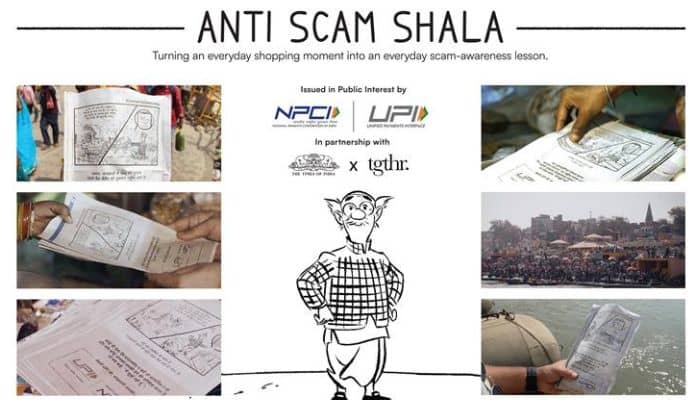India – At the world’s largest gathering, Maha Kumbh, creative agency tgthr. partnered with National Payments Corporation of India (NPCI) and The Times of India (TOI) to turn a humble everyday item—the newspaper bag—into a powerful tool for scam awareness.
The Anti Scam Shala campaign reimagined the #ConmanVsCommonMan initiative by embedding its comic strips into everyday newspaper pouches—making scam education part of routine transactions. Available in multiple sizes and regional languages, these pouches offered a simple yet scalable way to spread awareness.
While the comics already run fortnightly across seven newspapers, NPCI and TOI scaled the effort to build greater awareness of digital payment fraud and strengthen trust in UPI.
By tapping into the eco-friendly practice of using newspaper bags—already common among local vendors—the campaign turned an ordinary packaging material into a tool for public education. TOI’s wide circulation ensured the message reached millions in a language they understood.

Aalap Desai, CCO and co-founder of tgthr., said, “Newspaper bags are commonplace in India and quintessentially Indian. They are used everywhere, every single day, and their usage has increased significantly since the plastic ban in India and during the Maha Kumbh.”
Desai continues, “While the Maha Kumbh is primarily about the holy dip in the Ganges, a lot happens around it—daily shopping for items ranging from incense sticks, flowers, and diyas to bangles and everyday essentials like soap and cream. One thing common in all these transactions is the newspaper bag, which is handed to the customer just before they make the payment. So, we thought of leveraging this common yet unique touchpoint and turning it into a learning opportunity. This idea gave birth to the Anti-Scam Shala.”
The Maha Kumbh, the world’s largest gathering with over 65 crore devotees, also became the largest gathering of potential scam victims, creating a significant opportunity to educate people about scams and raise awareness. The event provided the perfect setting to reach a massive number of UPI users in a short time.

Through this campaign, every purchase—whether it was agarbattis or clothing—came with a unique #ConmanVsCommonMan scam, helping shoppers stay informed about the latest frauds and stay safe in their daily activities.
Sameer Sainani, president of Optimal Media Solutions, explained, “Maha Kumbh, the largest congregation of humanity, saw 65 crore people come together, making it an ideal platform to emphasise the safety of digital transactions. The Times of India’s iconic ‘Common Man’ became a symbol of vigilance through the Anti Scam Shala campaign. Paper carry bags with the digital safety message were placed at all points of sale, and millions of devotees were exposed to the digital safety message each time they purchased their puja wares at the Maha Kumbh, thereby reinforcing trust in UPI and digital payments and empowering millions to transact safely at Kumbh.”
“The Anti Scam Shala initiative reinforces our commitment towards promoting digital payments and their safety. TOI is extremely proud of this partnership with NPCI and tgthr. and is committed to the adoption of digital transactions in a safe environment,” he added.


